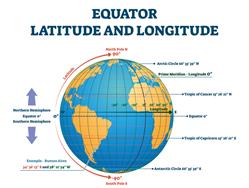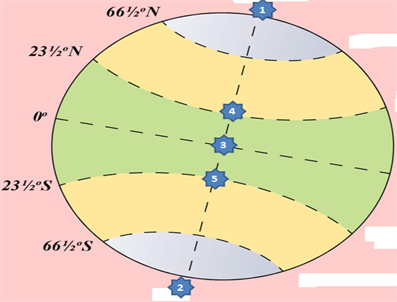
PUMPA - SMART LEARNING
எங்கள் ஆசிரியர்களுடன் 1-ஆன்-1 ஆலோசனை நேரத்தைப் பெறுங்கள். டாப்பர் ஆவதற்கு நாங்கள் பயிற்சி அளிப்போம்
Book Free DemoLatitudes and Longitudes
- Latitudes and Longitudes are horizontal and vertical imaginary lines drawn on the Globe to find the location and calculate distance and time.
- Ptolemy – First person to draw the lines of latitude and longitude on a map.
- ‘Geographia’ a book by Ptolemy

Latitudes
- Imaginary lines
- Runs horizontally on East - West direction on the Earth
- They are called the lines or parallels of latitudes.
- They are also called parallels, as they are parallel to the equators and never meet.
- The 0° line of latitude which divides the Earth into two halves is known as the Equator.
- These halves are known as Northern and Southern Hemisphere.
- From the Equator, parallel lines are drawn towards the North and South poles at equal intervals.
Important!
The latitudinal extent: 1° line of latitude =111km.

From the Equator toward North and South poles the length of the lines of latitudes decreases because is Geoid in shape.
- The 90° North and 90° South (Poles) are not lines, they are found as points.
- Northern latitudes – Lines of latitudes between the Equator and North Pole.
- Southern latitudes – Lines of latitudes between the Equator and South Pole.
Total number of Northern latitudes (parallels in northern hemisphere) = 89
Total number of Southern latitudes (parallels in southern hemisphere) = 89
Equator = 1
At poles (as points) = 2
Total number of parallels found on earth = 181 parallels
The Equator is the longest of all lines of latitude. Hence, it is also known as ‘The Great Circle’.